
Domingo Faustino Sarmiento was an Argentine activist,intellectual,writer,statesman and President of Argentina. His writing spanned a wide range of genres and topics,from journalism to autobiography,to political philosophy and history. He was a member of a group of intellectuals,known as the Generation of 1837,who had a great influence on 19th-century Argentina. He was particularly concerned with educational issues and was also an important influence on the region's literature.
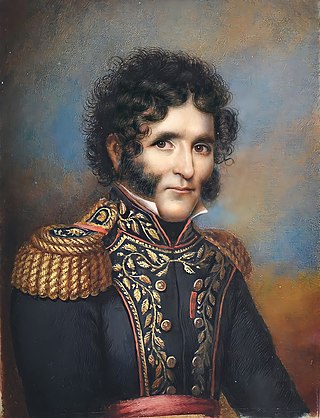
Juan Facundo Quiroga was an Argentine caudillo who supported federalism at the time when the country was still in formation.

Juan Martín de Pueyrredón y O'Dogan was an Argentine general and politician of the early 19th century. He was appointed Supreme Director of the United Provinces of the Río de la Plata after the Argentine Declaration of Independence.
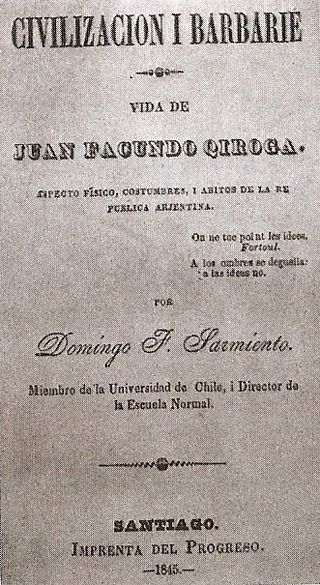
Facundo:Civilization and Barbarism is a book written in 1845 by Domingo Faustino Sarmiento,a writer and journalist who became the second president of Argentina. It is a cornerstone of Latin American literature:a work of creative non-fiction that helped to define the parameters for thinking about the region's development,modernization,power,and culture. Subtitled Civilization and Barbarism,Facundo contrasts civilization and barbarism as seen in early 19th-century Argentina. Literary critic Roberto González Echevarría calls the work "the most important book written by a Latin American in any discipline or genre".

The following is an alphabetical list of topics related to the Argentina.

Brigadier General JoséMaría Paz y Haedo was an Argentine military figure,notable in the Argentine War of Independence and the Argentine Civil Wars.
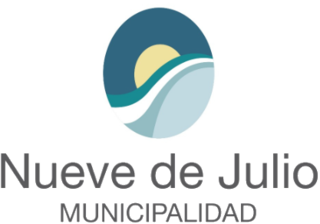
Nueve de Julio Partido is a partido in the central north of Buenos Aires Province in Argentina.
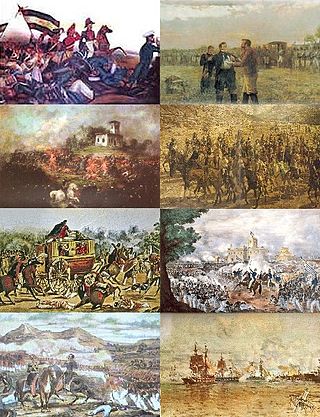
The Argentine Civil Wars were a series of civil conflicts of varying intensity that took place through the territories of Argentina from 1814 to 1853. Beginning concurrently with the Argentine War of Independence (1810–1818),the conflict prevented the formation of a stable governing body until the signing of the Argentine Constitution of 1853,followed by low-frequency skirmishes that ended with the Federalization of Buenos Aires. The period saw heavy intervention from the Brazilian Empire that fought against state and provinces in multiple wars. Breakaway nations,former territories of the viceroyalty,such as the Banda Oriental,Paraguay and the Upper Peru were involved to varying degrees. Foreign powers such as the British and French empires put heavy pressure on the fledgling nations at times of international war.
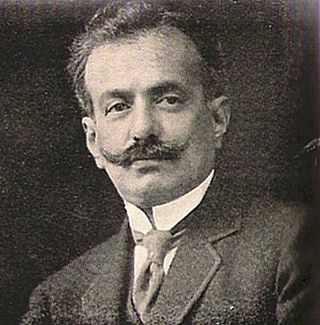
Ramón JoséCárcano was an Argentine lawyer,historian and politician who served as Governor of Córdoba from 1913 to 1916,and from 1925 to 1928.

The Argentine Civil Wars were a series of internecine wars that took place in Argentina from 1814 to 1876. These conflicts were separate from the Argentine War of Independence,though they first arose during this period.

Juan Felipe Ibarra was an Argentine soldier and politician. He was one of the caudillos who dominated the Argentine interior during the formation of the national state,and ruled the province of his birth for decades.
The Battle of La Ciudadela was a fight during the Argentine Civil Wars between Federalist troops commanded by Facundo Quiroga and Unitarian troops of Gregorio Aráoz de Lamadrid on the outskirts of San Miguel de Tucumán,Argentina,on 4 November 1831. It resulted in a decisive victory by the Federalists.

Alejandro Heredia was an Argentine soldier and politician. He fought in the war of independence,and in the subsequent civil war. He was governor and caudillo of Tucumán Province.
The Battle of Rodeo del Chacón,fought in Potrero de Chacón,Argentina on 28 March 1831,was a battle during the civil war between Unitarian and Federalist forces. It ended with the victory of General Facundo Quiroga,one of the most capable and well known of the Federalist caudillos.
The Battle of Rincón de Valladares was a battle during the Argentine Civil Wars. It was fought between Federalist forces led by Facundo Quiroga and Unitarian forces under Governor Gregorio Aráoz de Lamadrid,near the city of San Miguel de Tucumán. Quiroga was the victor,forcing Lamadrid to resign and go into exile in Bolivia,leaving the government of Tucumán Province in the hands of the Federalists.

Joseph Zenzano (c.1710–1790) was a Spanish nobleman,who served as Escribano Mayor de Gobierno of Buenos Aires,in the viceroyalty of Juan Joséde Vértiz y Salcedo.
The following lists events that happened or will happen in Argentina in 2019.
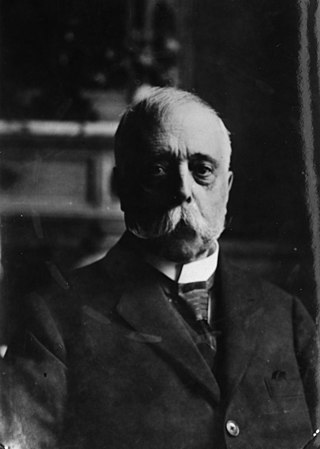
Marcelino Ugarte (1855–1929) was an Argentine jurist and politician,who served for two terms as governor of the Province of Buenos Aires. He also served as deputy and national senator for the Province of Buenos Aires.
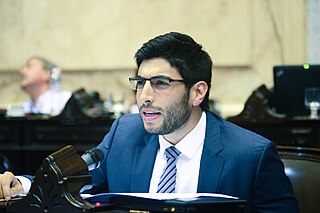
Juan Facundo Moyano is an Argentine trade unionist and politician. A member of the Party of Culture,Education and Labour (CET),Moyano was a National Deputy for Buenos Aires Province from 2011 to 2021.
Events in the year 2022 in Argentina.














